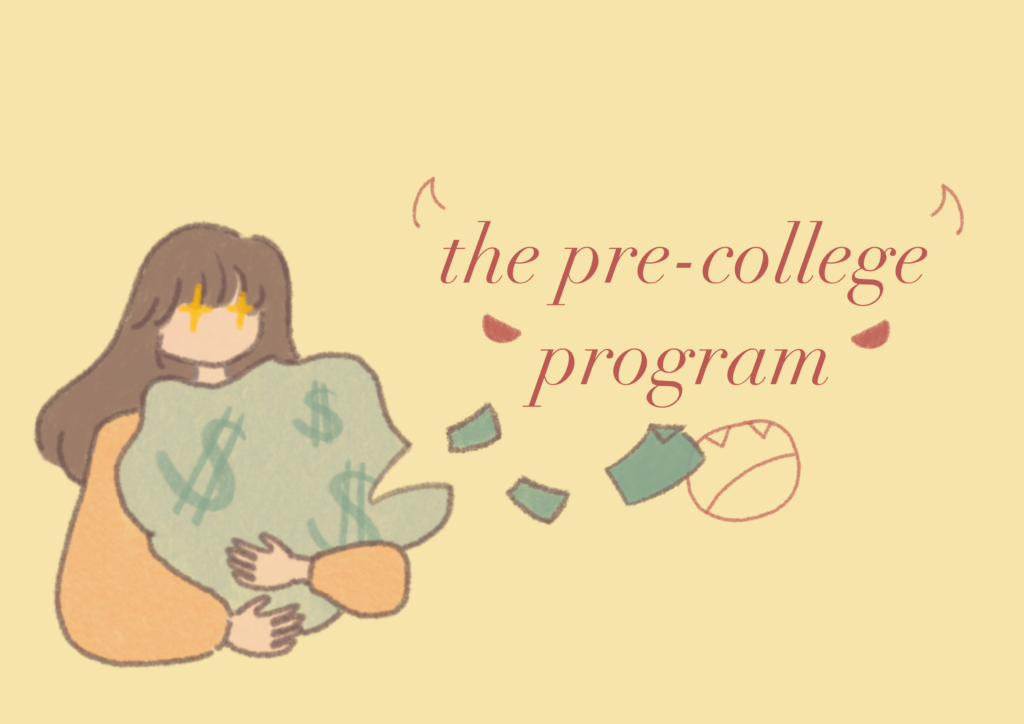Imagine spending your summer as a student at Brown University — sitting in the classes, roaming the streets of quaint Providence, Rhode Island, and interacting with Ivy League professors — all while you are still in high school.
This is the main selling point of one of Brown’s pre-college programs — Summer@Brown — and other similar pre-college programs that many students choose to spend their summers at. In short, pre-college programs allow students to take college classes, occasionally earn college credits and meet “like-minded peers.”
But what always fails to find its place on pre-college homepages is the exorbitant price. Summer@Brown, Brown’s 4-week, on-campus program burdens attendees with an $8,011 program fee, and University of Pennsylvania’s 5-week, on-campus program costs a shocking $20,962.
That’s more than the cost of one year at a UC. These costs raise the question: Is a pre-college program really worth the cost?
The short answer is no.
The long answer is: It depends.
It depends on what you want to get out of the program — if you are just looking to get one to three units of college credit (which comes at a pricey premium), to make a diverse range of friends (albeit income-restrictive), to escape from Saratoga for the summer, and — most importantly — if your parents do not mind the hefty price tag, go for it.
However, for students looking to increase their chances of getting into the school where the camp is hosted, find internships with the professors that teach their classes or take irreplicably enlightening college courses, attending pre-college programs is not some kind of magic bullet. There are much better and more cost-effective options.
Now why is that? According to admissions officers interviewed by the Washington Post, prestigious universities typically offer these pre-college programs to make money from their otherwise empty dorms and lecture halls during the summer, a time when most undergraduates are off-campus. By feeding false hope of undergraduate admission and using buzzwords like Stanford’s “intellectually passionate pre-college students” and Brown’s “challenging academics,” programs sell the image of being rigorous and selective, when in reality, there isn’t much prestige behind them.
Again, take Brown, for example. With my questionable “essays” written in a day, I was accepted to Summer@Brown. Although I am admittedly only one example, most SHS students with a GPA above 3.5 are more likely to get in than not.
As Christine Kim, a former assistant director of admissions at Yale said in an interview with CBS News about pre-college programs: “While acceptance isn’t guaranteed, a high school record of at least straight Bs should suffice.”
Many equivalent courses, minus the creative titles, can be found at community colleges or the UC Scout program, without the substantial charge. For example, an alternative to University of Pennsylvania Pre-College’s fancy-sounding “The Social Contract” course is West Valley College’s Social and Political Philosophy course. Other low-to-no-cost college programs like the Princeton Summer Journalism Program are just as, if not more, difficult, despite being significantly more selective. Generally, camps specializing in one course — like UC Santa Cruz’s Science Internship Program — are truly rigorous.
Nevertheless, although such programs do not significantly help college applications, there are still many benefits from attending. Junior Ivy Tian, who attended the 2023 Summer@Brown program on-campus for two weeks, pointed out that meeting new people and gaining personal independence away from home made the experience memorable.
“We had people from all over the world: from London, Korea and Japan,” Tian said. “It was really diverse, and since we only had three hours of class time each day, we spent a lot of time talking and learning about each other.”
The program also planned excursions for students through Boston, although Tian remembers the signups filling up so quickly that she could only attend one lackluster field trip to an aquarium. Instead, she found that the freedom to plan her own short-distance trips, such as to a nearby beach, were much more enjoyable. Despite curfews and resident assistants barring students from the advertised “true college experience,” Tian said trips with friends were the main highlights of her two weeks at Brown.
As for Tian’s classes, despite having only two weeks to introduce the supposedly complex topic of Abnormal Psychology, she felt that her professor explained the curriculum comprehensively and understandably — granted, the course was also not significantly more difficult than any of her high school sophomore-year classes.
In the end, Tian believes that although she enjoyed the program, it was not worth the money.
“I feel like I would have enjoyed it more if it had been a lot more academically intense,” she said. “This summer, I would probably prefer to attend something that isn’t just a pay-to-play program.”.
The important thing to remember is that attending a pre-college program does not guarantee admission to its host college — or other prestigious universities. You are better off finding unique ways to pursue your interests that do not burn a hole in your parents’ wallets, whether it be through taking community college classes, finding an internship or working a part-time job at a restaurant or summer camp.



























